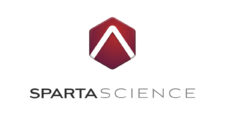Sales Growth

The Appleton Greene Corporate Training Program (CTP) for Sales Growth is provided by Mr. Longstaffe Certified Learning Provider (CLP). Program Specifications: Monthly cost USD$2,500.00; Monthly Workshops 6 hours; Monthly Support 4 hours; Program Duration 12 months; Program orders subject to ongoing availability.

Personal Profile
Mr Longstaffe has over 30 years of global experience in Sales, Consulting, and Training. His extensive background is instrumental in enabling him to design and deliver well proven and effective sales training solutions which improve the performance of professional salespeople. His training programs provide an extremely relevant learning experience equipping participants with meaningful and applicable skills that result in their adoption, action and successful results.
Mr Longstaffe is the CEO of a company he founded in 1998. It is a sales consulting firm and training solutions provider. Mr Longstaffe specializes in developing highly effective, practical tools and processes to improve professional selling skills in B2B sales teams. In the Sales Growth Program he has built an entire portfolio of training modules, drawing on his expertise in Consultative Selling, Account Management, Channel Management, Competitive Selling, Negotiations and Tactical Selling Skills.
Mr Longstaffe has worked for large corporations and high-growth start-ups. He has led sales teams, built channel organizations and created highly effective training curricula. Mr Longstaffe also worked with Sir Winston Churchill’s grand-daughter to develop a unique training program based on the leadership principles of Sir Winston Churchill.
Mr Longstaffe has worked with clients across the globe from a wide range of industries including Information Technology, Telecoms, Aerospace, Financial Services and Healthcare. He has extensive experience in international sales, having worked in San Francisco, London and Australia.
Prior to establishing his training business, Mr Longstaffe worked at ODI as Managing Director of their UK operation. ODI was a leading consulting firm in organizational development, corporate alignment, strategy deployment, leadership, quality and customer care programs. There he led the turnaround of the UK operation, re-branding the company and launching their new software-based Alignment Diagnostic tool.
Prior to joining ODI, Mr Longstaffe was a Director of Esprit Consulting Ltd, a sales training company, based in London. He was critical in the expansion of international business and, as Director of Business Development, forged a Strategic Partnership with KPMG. He succeeded in winning significant seven figure training projects with many global IT companies, and he opened new offices in San Francisco. On his return to the UK, he managed the global operations of Esprit with responsibility for the network of Channel Partners both in the UK and Overseas.
Mr Longstaffe began his career in Sales and Management with Jardine Matheson & Co in Hong Kong. Following his graduate training program, he took his first sales role as a new business sales executive in the air cargo subsidiary, Jardine Cargo International. He won the prestigious ‘Freight Forwarder of the Year’ award in his first year in the industry and immediately became the top performing sales executive in the company, a position he maintained until being promoted to Branch Manager. He built the most profitable branch office in the UK and was appointed Regional Sales Manager on the West Coast USA.
Mr Longstaffe has an MA (Hons) and BA (Hons) from Emmanuel College, Cambridge University, UK.
To request further information about Mr. Longstaffe through Appleton Greene, please Click Here.
(CLP) Programs
Appleton Greene corporate training programs are all process-driven. They are used as vehicles to implement tangible business processes within clients’ organizations, together with training, support and facilitation during the use of these processes. Corporate training programs are therefore implemented over a sustainable period of time, that is to say, between 1 year (incorporating 12 monthly workshops), and 4 years (incorporating 48 monthly workshops). Your program information guide will specify how long each program takes to complete. Each monthly workshop takes 6 hours to implement and can be undertaken either on the client’s premises, an Appleton Greene serviced office, or online via the internet. This enables clients to implement each part of their business process, before moving onto the next stage of the program and enables employees to plan their study time around their current work commitments. The result is far greater program benefit, over a more sustainable period of time and a significantly improved return on investment.
Appleton Greene uses standard and bespoke corporate training programs as vessels to transfer business process improvement knowledge into the heart of our clients’ organizations. Each individual program focuses upon the implementation of a specific business process, which enables clients to easily quantify their return on investment. There are hundreds of established Appleton Greene corporate training products now available to clients within customer services, e-business, finance, globalization, human resources, information technology, legal, management, marketing and production. It does not matter whether a client’s employees are located within one office, or an unlimited number of international offices, we can still bring them together to learn and implement specific business processes collectively. Our approach to global localization enables us to provide clients with a truly international service with that all important personal touch. Appleton Greene corporate training programs can be provided virtually or locally and they are all unique in that they individually focus upon a specific business function. All (CLP) programs are implemented over a sustainable period of time, usually between 1-4 years, incorporating 12-48 monthly workshops and professional support is consistently provided during this time by qualified learning providers and where appropriate, by Accredited Consultants.
Executive summary
Sales Growth
History
This program is intended for companies who realize that they need to make a step-change in the way they sell. They want to transform the selling style of their sales teams to help them differentiate themselves from their competition by the way they sell, not just by ‘what’ they sell.
Like so many other business processes, the sales function has seen unprecedented change in recent years. Many companies and leadership teams have struggled to keep up with this constant evolution. At one level you might think that selling today is the same as it ever was. The role of the sales professional being to provide a customer with all the relevant information they need in order to make a decision to buy a particular product or service. But in reality, that job has become much more demanding. The effects of the internet and globalization have resulted in 2 critical dimensions which have made the role of the salesperson today even more challenging: better informed customers and increased competition.
In the last 40 years we have seen the evolution of sales development and sales process from a product-led sales approach, through solution selling, to a more consultative selling process and ultimately to a sales process based on true partnership with a customer, fulfilling the role as a trusted advisor.
There are 4 levels of selling: Level 1 – Product-led Selling. At this level, salespeople are product focused, they understand their product but they are very transaction oriented, short-term and feature-function focused. They are dealing primarily with operational people, and they drive a commodity buying behavior. Level 2 sales is Solutions-led Selling. Here the salesperson has learned to be more Solution-focused: they are looking to match their solution to an existing customer need. They now understand the price vs. cost argument, and they start to sell on value. As a result, they are dealing with management, and now they drive a more value-based buying behavior. Level 3 selling is all about Consultative Selling, this requires a completely different approach. It means being Customer-focused (not product or solution-focused). Here the salesperson is looking to help the customer solve their business problems. They articulate the business value of their solutions in the customer’s terms. They will be dealing with Executives, and as a result will drive a more strategic, long-term buying behavior in which they also earn customer loyalty and win repeat business. Finally, Level 4 selling is what we call Partnership Selling. The sales professional is now completely Partnership focused. Here they help their customer identify and solve real business issues. They are seen as a Trusted advisor, helping their customer with their customers and their competition. Salespeople at Level 4 partner with customer executives as an equal, in a long-term business partnership focused on win-win and mutually beneficial outcomes.
All salespeople start as Level 1 salespeople, most stay there, some progress to Level 2. Very few salespeople and sales organizations are able to progress to Level 3 and even fewer to Level 4. Progression from Level 1 to Level 2 can come through experience. Further progression beyond that requires focus, change and external help and coaching. Our Sales Growth program will help you and your sales team to achieve faster growth and more profitable sales by developing a solid Consultative Selling process as the foundation for becoming effective Level 3 and Level 4 salespeople.
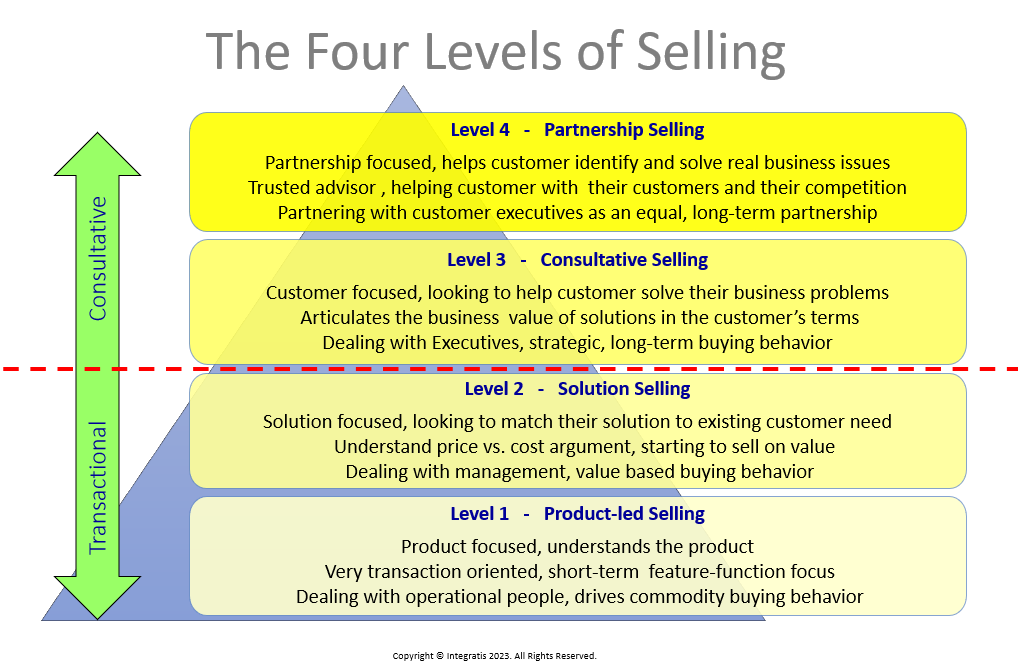
Current Position
Our Sales Growth program is based on proven processes developed and improved over more than 30 years through working with companies worldwide. The program has been successfully implemented in many different cultures and languages. The methodology has been adopted by companies large and small from global players like IBM to small start-ups.
Different industries and different markets are undoubtedly at different stages in their sales evolution journey. But there’s one thing that links them all: every organization is aiming to achieve more. Company revenue goals are becoming ever more aggressive, sales targets are more and more challenging and individual sales quotas are increasing as a result. So how can a sales organization respond to this constant need to do more with less? The answer lies in applying proven sales processes designed to help everyone in the organization to maximize their effectiveness in selling the maximum possible within their chosen sales territory. How can you do more with less? It means we need to change, to improve your overall sales process, thereby enabling higher productivity from the entire customer-facing team.
Sales Growth is a program focused on helping clients to implement a consistent, success-oriented selling process. The program is intended for organizations who are selling in a complex B2B sales environment. The aim is to build a discipline and rigor in helping sales teams to identify what they need to do to be successful and to give them the tools and techniques that will enable that success. The program starts at the high level with the development of a detailed TERRITORY SALES PLAN (TSP) which encompasses go-to-market strategy for sales teams and individuals and helps people to identify a strategic plan to achieve and exceed their sales quota.
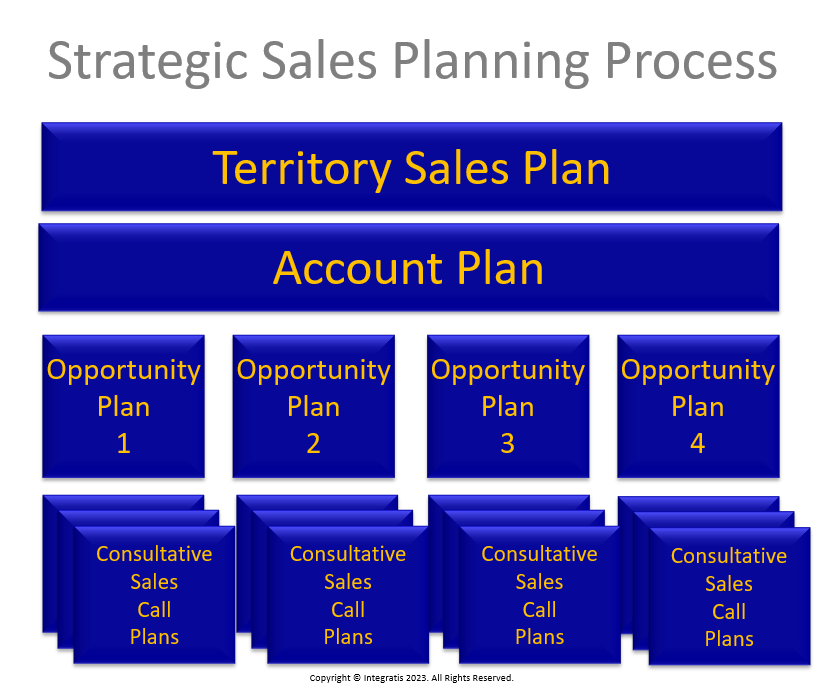
Once they have a clear strategy for their allocated sales territory the focus shifts to developing an aligned process for the development of detailed ACCOUNT PLANS. The Account Planning process will help them to define a strategy for each major account which they have targeted. Through that they will achieve the goals of the TSP.
Within the Account Planning process, the focus then shifts to the SALES OPPORTUNITY PLAN process which itself includes a number of elements such as Developing and Articulating a Compelling Value Proposition, Gaining Entry to new accounts and new contacts, People Strategy and Competitive Sales Strategy. This process is all about developing consistent repeatable processes for winning large deals. It is based on the fact that increasingly in a B2B sales environment, sales teams are faced with the need to manage a much more complex and educated customer, where more people are involved in making the buying decision and that buying decision is the result of consensus, not dictate.
Finally, the focus shifts to the highly actionable process of CONSULTATIVE SALES CALL PLANNING which includes the need to conduct effective research on the people who your salespeople are meeting with and then the development of Customer Rapport, Consultative Questioning, Objection Handling and Closing.
The consistent top-down and bottom-up alignment of the strategic sales growth process will enable sales teams to win more business and sell more profitably in an increasingly complex and competitive market environment.
Future Outlook
B2B sales will continue to evolve. There are 3 significant drivers of change which will no doubt continue to accelerate: i) The growth of consensus decision-making which means that there will be more and more people involved in making the decision to buy. This in turn makes the sales role more challenging as sales professionals must develop strategies to meet with people outside their comfort zone and they need to be comfortable in articulating their value proposition in many different ways ii) The increasing complexity of business and the inter-relationship between different business functions. This contributes to item i) above and it also means that not only will salespeople have to be able to articulate the value of their solutions for different types of buyer, they also need to equip their internal coaches and champions to be able to convincingly re-tell the value story to their colleagues and iii) Better informed customers can and will conduct in-depth research of all of the options and solutions that are available in the market. As a result, a product-led sales approach offers no value to the customer and salespeople need to focus on delivering relevant insight and value.
These changes will necessitate salespeople respond effectively by adopting a true Consultative approach. Our Sales Growth program, based on the Integratis Consultative Selling methodology, will provide exactly what is required. Salespeople will need to differentiate themselves more through ‘how’ they sell, than by ‘what’ they sell. Increasing competition and the effects of globalization will mean that customers can acquire similar solutions from elsewhere. Even in situations where a company might have a clear product or solution advantage, that advantage will be short-lived and B2B salespeople selling complex solutions to large organizations will need to explain how their solutions deliver meaningful business value and competitive edge. Salespeople need to provide insight and ideas. They need to help customers see how their solutions can help their customers beat their competitors.
In addition to all of the above, salespeople in the future will be faced with ever-growing mountains of Data. Information growth has exploded in recent years. Salespeople are drowning in information. They can’t see the wood for the trees. Trawling through all the information to identify what is relevant is already a challenge for many people. Sales Growth is a program which has, and will continue to, evolve and adapt to suit the needs of different businesses, industries and cultures. Future challenges and new developments will always be incorporated. We are already including the latest tools such as ChatGPT to help salespeople better analyze the data and improve their process and insight.
Curriculum
Sales Growth – Part 1- Year 1
- Part 1 Month 1 Growth Playbook
- Part 1 Month 2 Territory Sales Planning
- Part 1 Month 3 Account Planning
- Part 1 Month 4 Sales Differentiation
- Part 1 Month 5 Sales Opportunity Planning
- Part 1 Month 6 Building Financial Value
- Part 1 Month 7 People Strategy
- Part 1 Month 8 Competitive Strategy
- Part 1 Month 9 Call Planning
- Part 1 Month 10 New Business
- Part 1 Month 11 Objection Handling
- Part 1 Month 12 Closing Deals
Program Objectives
The following list represents the Key Program Objectives (KPO) for the Appleton Greene Sales Growth corporate training program.
Sales Growth – Part 1- Year 1
- Part 1 Month 1 Growth Playbook – As the introduction to the Sales Growth program this module will provide the foundation for the development of your Consultative Selling Process.
- Part 1 Month 2 Territory Sales Planning – Every salesperson or sales team has a defined Territory in which they operate and for which they are responsible. Their goal should be to extract the maximum amount of value (sales revenue) from that territory each year. This module focuses on the development of this first high-level analysis of the territory from the perspective of where the revenue will come from.
- Part 1 Month 3 Account Planning – In this workshop we introduce the Account Planning Process and provide you with a repeatable methodology for managing your key accounts using an Account Plan.
- Part 1 Month 4 Sales Differentiation – This module focuses on how consultative sales organizations can differentiate themselves through Consultative Selling and the use of our unique TOPS process.
- Part 1 Month 5 Sales Opportunity Planning – Having developed an effective Account Plan the focus now shifts to developing winning sales strategies to win every individual, specific sales opportunity. In this workshop we introduce the need for have a clear sales strategy for every sales campaign, focused on bringing meaningful, compelling value to the customer.
- Part 1 Month 6 Building Financial Value – In this workshop we introduce a process for salespeople to develop their financial acumen through the ‘Financial Business Acumen for Sales’ process. The workshop will provide additional tools and process to help salespeople to define a more relevant, compelling value proposition for inclusion in their Sales Opportunity Plan.
- Part 1 Month 7 People Strategy – This next workshop introduces another major change in sales process in order to achieve sales growth, namely developing an effective People Strategy to expand the number of contacts within a customer and to win the support of all of the people in the customer team who will influence the decision to buy.
- Part 1 Month 8 Competitive Strategy – To win in sales you have to compete. Every single sales campaign is a competitive sale. Even if there is no obvious competitor for the solution you provide, there are other competing projects within the customer. There are sure to be people in the customer who would rather spend their money in a different way. This workshop provides a process for beating the competition.
- Part 1 Month 9 Call Planning – The ability to plan and execute effective customer meetings is an essential skill of a Consultative Sales Professional. Sales teams can improve their effectiveness and efficiency by using a proven Consultative Sales Call Planning process.
- Part 1 Month 10 New Business – This module is all about Breaking into New Accounts. For most organizations, a key factor in achieving their sales revenue growth targets is going to be based on their ability to win new business in new accounts, new logos. Your ‘land and expand’ strategy doesn’t work unless you can successfully land first.
- Part 1 Month 11 Objection Handling – As we will have seen in the call planning session, customers will have their own questions too. Sometimes these are voiced as objections, other times simply as questions for the sales team. This workshop introduces a process for handling customer objections and the importance of adopting a more consultative approach to the objection handling process.
- Part 1 Month 12 Closing Deals – The final workshop in this program focuses on how to achieve a growth in sales by closing more business, more quickly and more profitably. This is partly related to the development of effective closing techniques and partly focused on developing a realistic plan to close the sale for the right amount within the defined timescale.
Methodology
Sales Growth
Program Planning
Planning is key to your successful Sales Growth strategy. It will also promote greater alignment between the Sales Plan, Go-To-Market plan and overall Business Plan for the company. In the program you will be provided with tools and methodology to improve your sales planning processes. We will begin at the high level, with a focus on the strategic plan for how your teams will grow sales revenue within their specified Territory. This Territory Sales Plan will provide the blueprint for the rest of the process. Just as a house is first built from a set of plans, so too is the Territory Sales Plan the foundation for what follows.
The planning process is integrated and encourages alignment throughout the planning process. This planning process itself encourages consistency in approach and ease of information sharing between different cross-functional teams. The Integratis Strategic Sales Planning process is both a top-down and bottom-up planning process. You will see Sales Call Planning as a key element of Sales Opportunity Plans. These in turn form part of an Account Planning process, which in turn forms a key element of the Territory Sales Plan.
Depending on the different stages of sales team maturity, it is possible for teams to start at the top, developing a strategic plan for implementation. This works well, for example, when the process is being implemented as a plan to break into new markets, new countries or new territories. Equally, in other scenarios, sales teams may already be engaged in selling to specific customers, in which case the planning process can start at the bottom with the development of Consultative Sales Call Plans and evolve from there to Opportunities, Accounts and Territories.

Program Development
The program development phase of the Sales Growth process is where we focus on the strategic shift in thinking which is required for sales teams to make the transition from being Level 1 or Level 2 Product and Solution-focused sales teams to becoming truly Consultative. Developing this new customer-first approach is not easy when teams have spent the bulk of their careers focusing first on the products and solutions that they sell. It is in itself a key reason why this ‘glass ceiling’ exists and prevents many sales teams from progressing to Level 3 and Level 4 selling.
We provide the tools and processes to help sales teams develop their new approach. During the program workshops, people will be challenged to think differently and to develop an innovative new approach which differentiates themselves from other salespeople selling to their customers.
Exercises throughout each monthly workshop will force salespeople to apply new thinking and new ideas to the development of their planning tools. The plans then become the Action Plans that drive change through the implementation of the plan, they include new customer-facing activity designed to build confidence in the sales professionals’ ability to turn planning into action.

Program Implementation
Program implementation is where the rubber hits the road. The work study at the end of each workshop will encourage the teams to put their new strategy and ideas to the test in real meetings with customers and colleagues. In addition, the design and output from each workshop can be integrated with your company CRM system so that the process is reflected in the sales tools that your teams use on a daily basis.
This certainly requires the active involvement of your Sales Ops and CRM team but the program materials and process have been integrated with most CRM systems including SalesForce, MSDynamics and SAP. The program tools and methodology is designed to be system agnostic and can be implemented using standard business tools such as MSOffice and GSuite.
Throughout the program we will work with sales professionals and their managers to encourage regular review of the output from each session and promote active coaching, mentoring and support by sales managers. The real proof of the pudding lies in the improvements made in sales campaigns and in the development of new business opportunities with existing and new customers.

Program Review
Each of the process elements introduced throughout the Sales Growth program provide the basis for ongoing review and coaching. The Sales Growth program will provide salespeople, cross-functional virtual teams, and management with the tools and structure to review progress and monitor results.
From the outset, the Territory Sales Plan is designed with a built-in Quarterly Business Review process that encourages monitoring and review. Each QBR is an opportunity to measure results and to drill-down to determine what is working well and what needs further improvement. At a more operational level, the Sales Call Plans and Sales Opportunity Plans can be integrated with your company sales management review process to define and agree specific actions in respect to key sales opportunities.

Program Outline Plan
Growth Playbook
As the introduction to the Sales Growth program this module will provide the foundation for the development of your Consultative Selling Process. Recent research by Gartner showed that 74% of customers choose the buy from the company that first brought them the idea. Knowing this is an essential building block for your consultative selling methodology. It means you need to get involved early, much earlier in the buying cycle than most salespeople think. For many salespeople, educated in a more basic, customer needs-based approach, this represents a major challenge. A traditional needs-based sales process assumes that the customer already knows what they need. A more consultative sales approach requires salespeople to get involved early in the buying cycle. This means challenging the customer a little, helping them by providing the insight and ideas.
Having developed a foundational understanding of consultative selling, this introductory module will help you develop your new ‘Sales Growth Playbook’. This will include what needs to be done to include all the key stakeholders who will need to support the changes in the process and new process implementation for the sales teams. We will focus on defining key sales goals: beyond simply sales revenue. The process starts by thinking about key metrics and measures that can help you ‘move the needle’ in terms of higher sales revenue. This might include things like: shorter sales cycles, closing higher value deals, winning more repeat business, expanding sales territories, launching new products, selling high and wide within large accounts, developing an effective ‘land and expand’ strategy or breaking into new accounts. The output from this project study is a Sales Growth Playbook which will guide you on your sales development journey.
Territory Sales Planning
Every salesperson or sales team has a defined Territory in which they operate and for which they are responsible. Their goal should be to extract the maximum amount of value (sales revenue) from that territory each year. This module focuses on the development of this first high-level analysis of the territory from the perspective of where the revenue will come from. It will encourage sales teams to be more analytical about how they approach the need to achieve their sales targets.
Territory Plans can be developed for a sales manager’s territory or for individual salespeople. This workshop focuses on helping you to develop and define a winning strategy for growing sales within an assigned territory. The territory might be geographic, or line-of-business focused. The workshop will enable you to develop a clear process for defining how you will make and exceed your sales target for this territory each year. You will explore the projected business potential, analyze your quota, determining how much of the required sales revenue will come from existing accounts (account expansion) and how much from new business. Then you will analyze the market in terms of major accounts, identifying 5-10 key accounts for which you will develop Account plans in the next workshop.
The output from this module will be a work project in which you create a Territory Sales Plan (TSP) which can form the basis for ongoing Quarterly Business Reviews (QBRs) with the leadership team. The TSP will include clearly defined actions which will accelerate your Sales Growth strategy.
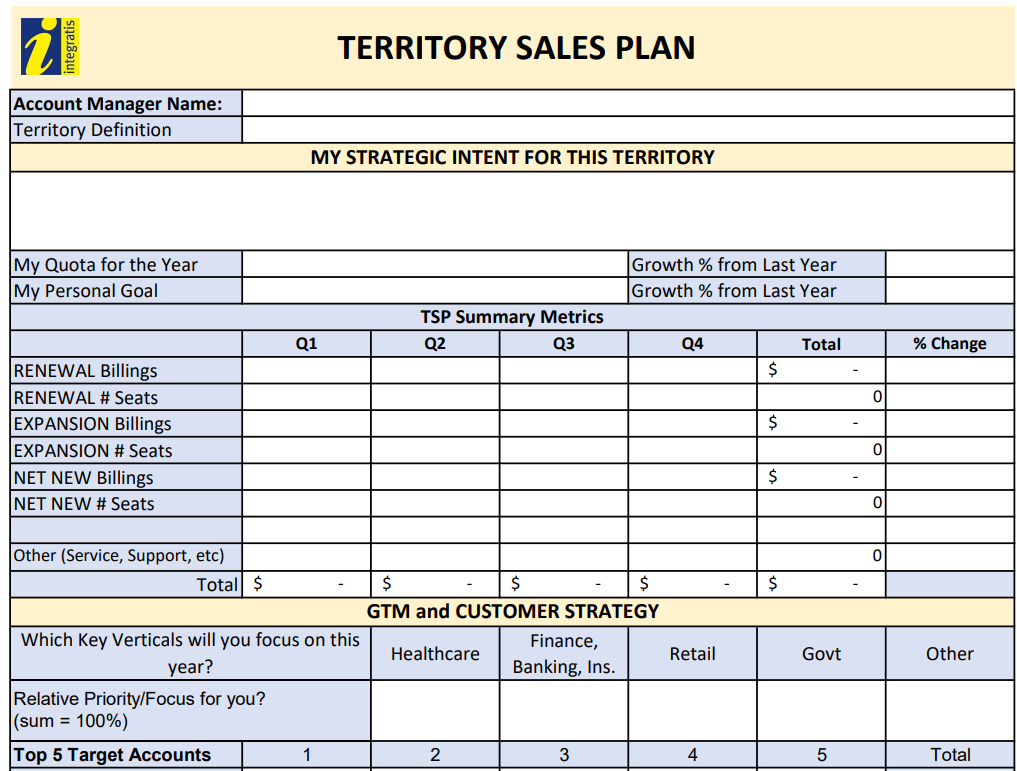
Account Planning
In this workshop we introduce the Account Planning Process and provide you with a repeatable methodology for managing your key accounts using an Account Plan. The Account Plan is owned and developed by the sales professional but requires the active input and involvement from other cross-functional team members. These people will include people in your management teams, marketing, product, support and customer service. Ultimately, it’s a cross-functional team effort, focused on increasing revenue and maximizing the potential business from your largest accounts.
Our Account Planning process has been proven to make a difference. It includes 8 key focus areas: Customer Analysis, Our Strategic Intent, Customer Business Objectives and Key Initiatives, Insights and Trends, Key Stakeholders, Partner Strategy, Sales Opportunities and a detailed Action Plan. The last part is key, the whole focus on developing a plan is to identify key actions required by the sales team in order to grow revenue in this account.
The process for developing the Account Plan will start with an in-depth Customer Business Analysis, enabling you to identify the customers’ key business drivers which will motivate them to do more business with you. The customer analysis will enable you to identify key stakeholders in the customer team and start the process of your expansion of key contacts in the customer. It will define your own strategic objectives for the Account, recognizing that some will be long-term, others more medium term and it will highlight the short-term priorities for Account Development.
The Account Planning process is one which can be undertaken for existing large accounts and for accounts which represent significant potential, big wins in terms of new business i.e. prospects with whom you do not currently have any business, but with which you need to develop new business in order to achieve your sales growth targets for your territory.
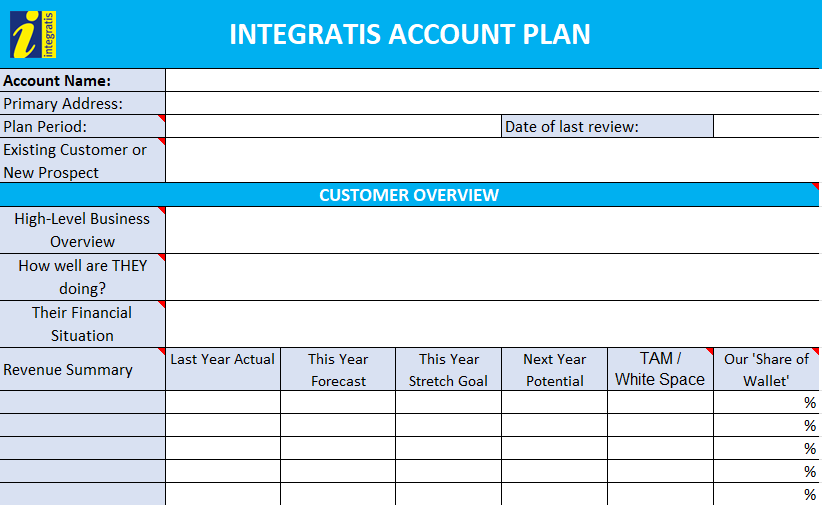
Sales Differentiation
This module focuses on how consultative sales organizations can differentiate themselves through Consultative Selling and the use of our unique TOPS process. Growing sales revenue means winning more business. More business than your competition. This requires a new sales process based on a consultative selling methodology in which your sales teams start to become regarded as trusted advisors to their customers.
This workshop introduces a unique methodology based on TOPS (Trends, Opportunities, Problems, Solutions). The process starts with detailed research on the key market Trends which are, or will be, impacting your customers and targeted prospects. To identify these effectively you need to focus more on the customer and less on your own products and solutions. We will help you identify Present, Growing and Future trends which could impact your customer. These trends might be macro trends which can impact the whole economy or industry specific trends which either impact your customer’s industry or impact the industries that they sell to. The purpose of identifying and analyzing these trends is so that your salespeople can differentiate themselves from their competitors by having a deeper understanding of the customer and the challenges they face.
The next step in the TOPS process (Opportunities and Problems) is to analyze the impact that these trends might have. Some trends may create Opportunities for the customer, others may create Problems. The process helps you to highlight future Opportunities for the customer, thereby enabling you to provide some differentiating insight and ideas. Remember, customers buy from the company that first brought them the idea. This is how you position yourselves to do just that.
The Trends can also impact customers in a more negative way. They can create Problems which the customer might be ill-equipped to deal with. Equally, sometimes Problems arise from the customer’s inability to effectively capitalize on the Opportunities that the Trends create. Either way, your TOPS strategy is to be the trusted advisor by bringing these issues to light and then to help the customer see that a Solution exists. Your next step will be to demonstrate how you can be part of a Solution to help them capitalize on the opportunities or minimize the problems. At that stage you have become a true trusted advisor, someone working in partnership with them to solve real business challenges. You will now have started to develop your Level 4 Partnership Selling skills.
Sales Opportunity Planning
Having developed an effective Account Plan the focus now shifts to developing winning sales strategies to win every individual, specific sales opportunity. In this workshop we introduce the need for have a clear sales strategy for every sales campaign, focused on bringing meaningful, compelling value to the customer. The core process element here is a strategic ‘Sales Opportunity Plan’. This involves the introduction of a consistent sales opportunity planning process for all complex deals in the company above an agreed threshold. Each company will choose their own criteria, but these will typically include i) all deals above a specified $ value in sales revenue, ii) all new deals with net new customers (break-in opportunities), and iii) strategic deals as defined by an Account Plan or Territory Sales Plan.
The goal of the Sales Opportunity Plan is to help you develop strategies to win a specific deal. The consultative sales nature of the Sales Opportunity Plan starts by ensuring that your team focuses on the customer first. You focus on your customer not on your product. The process challenges you to identify win-win objectives for the opportunity, starting with the customer’s specific business objectives for each sales deal that you are proposing. To succeed in winning the support of all of the people in the buying team you need to identify what’s in it for each of them to support your solution. The Sales Opportunity Plan
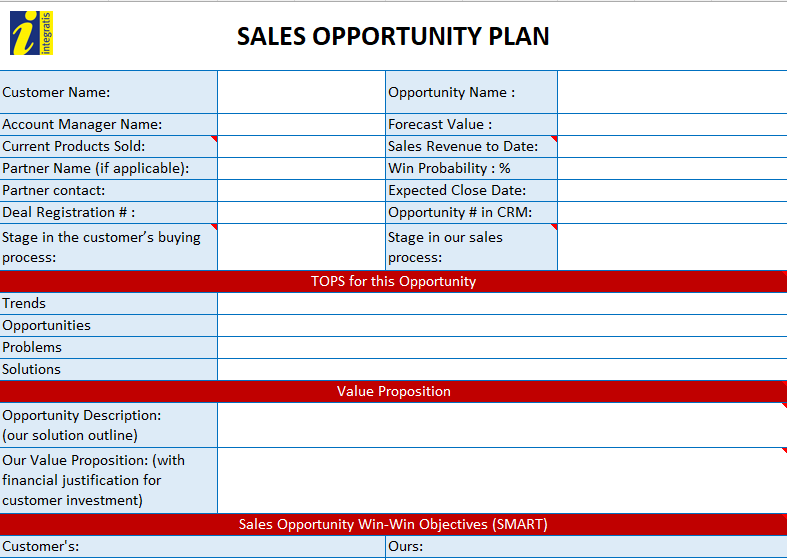
Building Financial Value
Many sales organizations talk about value, value propositions and value-add, but in reality, few of them have an effective process to turn their value messages into meaningful financial value. In this workshop we introduce a process for salespeople to develop their financial acumen through the ‘Financial Business Acumen for Sales’ process. The workshop will provide additional tools and process to help salespeople to define a more relevant, compelling value proposition for inclusion in their Sales Opportunity Plan. It also helps salespeople to equip their internal sales coaches and champions to sell-on the value message to other stakeholders in the customer. For example, it is not uncommon to find that technical buying influences within the customer may have selected your solution, but they are unable to convince senior management or financial team to support the decision to buy. Or more often the decision to buy now, rather than delaying. This workshop helps your sales teams to overcome this challenge.
The workshop will enable salespeople to identify the key customer metrics in an Annual Report; and to interpret basic information in the customer Profit and loss Statement (P&L), Balance Sheet and Statement of Cash Flows. We de-mystify the fundamentals, helping sales professionals to understand the customer key metrics. The workshop focuses on ROI, NPV, IRR and Payback Period.
We help salespeople to understand and calculate the Simple ROI for their solution. Then we illustrate the impact of NPV (Net Present Value), and we help salespeople to understand the impact that this has on the customer’s financial decision-making. We then explore how the customer uses IRR (Internal Rate of Return) to compare different options. Salespeople tend to focus solely on the solution they are selling whereas the customer’s management and finance team have to evaluate multiple different investment opportunities and make a decision based on tangible business value. The module explains investment hurdle rates and the impact on the customer’s decision to buy. We will also explain Payback Period and the growing importance that this has on the buying decision.
Having covered the basics, the workshop will focus on helping sales teams to develop more financially focused value propositions for the solutions they are selling and provide more confidence in having more financially focused conversations with customers.
People Strategy
This next workshop introduces another major change in sales process in order to achieve sales growth, namely developing an effective People Strategy to expand the number of contacts within a customer and to win the support of all of the people in the customer team who will influence the decision to buy.
The process starts by expanding the salesperson’s traditional narrow focus to identify all of the potential people who will influence the decision to buy. Current research indicates that in high-value complex sales campaigns, there are now 14-20 people in the customer team involved in providing input to the buying decision. This number is increasing every time a research study is completed. It has risen from 5 people a decade ago to 14+ today. Many salespeople are not even effectively communicating with 5 people in the customer. This workshop provides a process for identifying the key people, understanding their key buying motivation and developing a strategy to get them to support your value proposition.
The process starts by defining the key Buying Personas for your solutions and then developing techniques to explore each individuals’ distinct motivators. In addition, the process will help sales teams to use consistent terminology when talking with colleagues about members of the customers team. It will help teams to define the ultimate Decision Maker and to identify the key Recommenders. It also challenges people to explore all of the ancillary people who might legitimately be Influencers in the buying decision.
Our People Strategy workshop will help you to identify the primary buying role of each of these people and then to define those who may have a secondary role. These secondary roles include that of a Coach, Champion and Opponent. We will help you develop strategies t identify and develop potential Coaches and champions in order to increase your chances of winning each sales opportunity and grow revenue. There needs to be a recognition that the sales team may not be able to meet personally with all of these buying influences and they therefore need to develop a strategy whereby their key supporters in the customer team are equipped with the tools which will enable them to effectively articulate the value story within the customer team.
Competitive Strategy
To win in sales you have to compete. Every single sales campaign is a competitive sale. Even if there is no obvious competitor for the solution you provide, there are other competing projects within the customer. There are sure to be people in the customer who would rather spend their money in a different way. This workshop provides a process for beating the competition. This includes differentiating yourself from the external competition and winning support from, or neutralizing, the internal competition which might also include the inertia of maintaining the status quo.
We explore the origins of Competitive Sales Strategy using the teachings of Sun Tzu. You will identify the 4 key competitive sales strategies and analyze which is the best strategy for you to employ in any given scenario. We will help you to identify your competitor’s strategy and develop an effective counter-strategy to defeat them. You will explore comparative strengths and weaknesses and put yourselves in the shoes of the customer. Making a buying decision is not easy and we will explore customer Risk Sensitivity and how to overcome the challenges that his represents.
The output will be a competitive sales process and work study which can be used to defeat your most common competitors. The workshop also encourages salespeople to do the same for their ’personal competition’ i.e. the sales teams in the companies with whom they regularly compete. Thereby developing a winning strategy in their local market.
Call Planning
The ability to plan and execute effective customer meetings is an essential skill of a Consultative Sales Professional. Sales teams can improve their effectiveness and efficiency by using a proven Consultative Sales Call Planning process. B2B sales happen when your salespeople talk with and meet with people in the customer. That interaction is critical to the success of the entire sales strategy. This workshop has been proven to help sales teams achieve their revenue growth objectives. Effective call planning can help your teams to achieve more in every sales call, this reduces the number of meetings required to close a deal, thereby shortening sales cycles and growing revenue, every quarter and every year.
The workshop introduces the Consultative Sales Call Planning methodology. The process starts by clarifying the sales meeting objectives. These then define exactly who needs to be in each meeting in order to accomplish those objectives. This in itself reduces the number of meetings required because salespeople will ensure that the right people are present at each meeting. We encourage salespeople to develop a meaningful, business-focused agenda for the meeting and to share that with the customer in advance. Everything in the sales call planning process is designed to help your salespeople to differentiate themselves from their competition by exhibiting their professionalism and their focus on the customer.
A key element of this process is helping salespeople to plan, prepare and rehearse an engaging opening statement. This gets each meeting off to the right start. Ideally the statement is really a question, a question designed to get the customer talking at the beginning of the meeting, thereby encouraging effective dialogue. The opening statement should end with a question which is based on a high-gain question. We explain what these are and how to use the customer analysis that the teams have undertaken to share TOPS and improve the likelihood that the customer will start talking early in the meeting.
Having established meaningful dialogue focused on the customer’s business issues, the call planning process continues with the development of a series of effective Consultative Questions using the consultative questioning process based on Perception, Implication, Business-Value, Validating and Leading questions. In the project study which follows this workshop you will end up with a usable and repeatable list of good consultative questions which can be used by the entire customer-facing team.
In addition to planning your own questions, the call plan will help you to think ahead about the likely questions or objections which the customer’s team might raise. The call plan forces you to consider each of these and to prepare effectives responses to each question or objection.
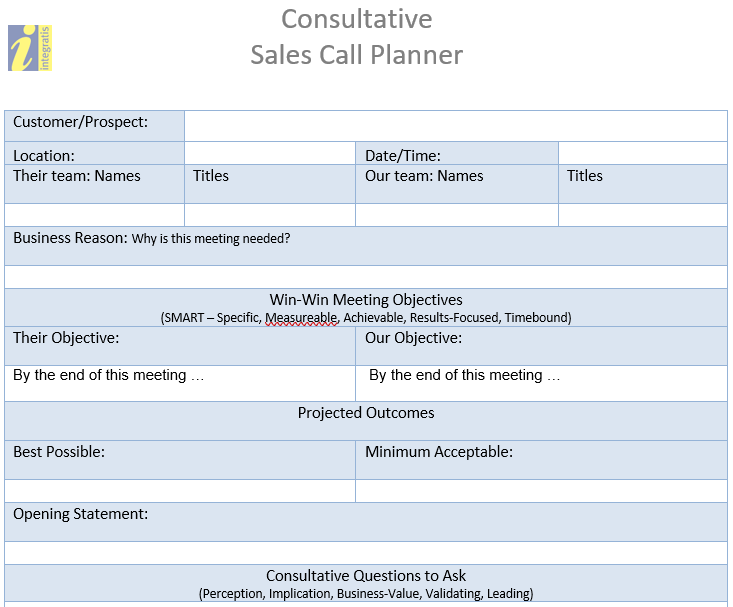
New Business
This module is all about Breaking into New Accounts. For most organizations, a key factor in achieving their sales revenue growth targets is going to be based on their ability to win new business in new accounts, new logos. Your ‘land and expand’ strategy doesn’t work unless you can successfully land first.
This workshop helps you to develop a process for breaking into new accounts, a process that can also be used to secure meetings with new people inside your existing accounts. It starts by encouraging sales teams to explore different modes of gaining entry and different people to target. Most salespeople target the people in roles which correspond to their selling comfort zone. However, these might be the very people who have already chosen to buy from the competition. The workshop will challenge you to think outside the box and find new prospects to call.
This highly interactive workshop will enable you to develop your own ‘recipe’ for success, based on a cadence of communication. Most customers typically only respond after the 10th-12th attempt by a salesperson to contact them. Most salespeople give up after 1-2 attempts, and they rely too heavily on one approach. This workshop will help you to develop a successful strategy based on effective use of voicemail, email and social media. You will improve your LinkedIn profiles as a basis for more successful outreach and fine-tune your value messaging to deliver more relevant, engaging value propositions to secure your first meeting, be that by phone, online meeting or face-to-face.
We will help you to develop a prospecting list to identify viable prospects within existing and new accounts. The workshop will help you formulate a process for creating effective ‘entry value statements’ for each of the different buying personas that your team is looking to meet with. Based on that new messaging, you will craft emails and write scripts for leaving voicemails. Each of these will be shared and practiced with your colleagues in an interactive prospecting session.
Objection Handling
As we will have seen in the call planning session, customers will have their own questions too. Sometimes these are voiced as objections, other times simply as questions for the sales team. This workshop introduces a process for handling customer objections and the importance of adopting a more consultative approach to the objection handling process. We will explain the LACRR process for handling customer objections (Listen, Acknowledge, Check, Restate, Respond). Most salespeople instinctively go straight from listen (sometimes barely) to respond. In so doing, they either miss the real objection or they answer the wrong concern. The workshop will encourage the use of ‘Golden Silence’ to tease-out more information from the customer so you can be sure that you are answering their objection in the right way.
The workshop will help you to develop a consistent response to the most common customer objections. It starts by identifying what these most common objections are and then seeks to determine the most appropriate response. Participants learn from each other’s experience and collectively we develop best in class answers to these typical objections.
This workshop will also stress the importance of getting and welcoming customer objections as a core part of the buying process. If there are no objections, there is no sale. If the customer does not have any objections, it means they are not interested. They are bound to have questions and we should welcome these as key buying signals and respond accordingly. The workshop will enable you to enhance your Consultative Sales Call Plan by thinking in advance about the customer objections which are likely to arise in any sales meeting and to develop your response in advance, thereby improving your effectiveness in handling the objection, and giving the customer more confidence in your solution.
Closing Deals
The final workshop in this program focuses on how to achieve a growth in sales by closing more business, more quickly and more profitably. This is partly related to the development of effective closing techniques and partly focused on developing a realistic plan to close the sale for the right amount within the defined timescale. Most companies face a problem wherein the sales teams miss their sales forecasts, not through losing the sale, so much as a result of failing to accurately predict when a deal will close and for how much.
This workshop focuses on “Deals, Dates and Dollars”. We introduce a unique closing process based on the implementation of Mutual Action Plans (MAP). The MAP is developed by the sales team with the customer as soon as a verbal order has been received. It is a mutual plan, drafted by the sales team and discussed with the customer. The MAP outlines all the actions required on both sides of the partnership to achieve an implementation by the desired customer ‘Go Live’ date. Through effective use of this process, your sales team can identify all of the hurdles that need to be overcome, and to make sure that ‘getting the PO’ is just one small step in what is often a multi-week, or even multi-month process.
The work study output from this session will produce a real MAP for a current live opportunity. Implementation of the MAP process will see you concluding your SALES GROWTH journey with a proven process to win more deals, more quickly, thereby increasing sales revenue.
Industries
This service is primarily available to the following industry sectors:
Banking & Financial Services
History
Traditionally, the banking and financial services industry was mainly seen as a steady, slow changing, ‘bricks and mortar’ business. It relied heavily on relationships, and tried and tested processes that were usually very slow to change. Technology innovation started to change all that. First was fax machine. This transformed the typical workday. Previously, the working day revolved around receipt of the mail, responding to those enquiries, and sending a reply before the mail was collected in the afternoon. The fax changed all that. All of a sudden you could receive sales enquiries and reply within minutes. Not surprisingly, fax machines were rapidly implemented throughout the business. Not too long we saw the introduction of more computer systems into the front-office operations as well as the back-office. This was flowed by the slow and unreliable dial-up internet, but slowly but surely the financial services industry changed from being almost totally based on person-to-person contact, to being almost 100% reliant on the new information technology. Banks, insurance companies and other financial institutions have become some of the biggest and best users of all the new technology available.
This too has transformed an industry which was based on a relatively small number of large players to one in which new start-ups can enter and disrupt the market. Government regulators have had to scramble to keep up with all of the new ideas, threats and challenges. Financial services companies have had to change their approach and focus on a very different value proposition to attract new customers and retain the ones they have.
Current Position
New technologies have been successfully adopted by most of the leading financial services players. These provide problems and opportunities for companies looking to grow their revenue in an ever-changing landscape. Many companies completely underestimated people’s propensity to embrace new technology when it comes to things like online banking, crypto currencies and fintech in general. All this change has also led to a major shift in the way that Banks and other financial institutions need to develop new business, especially in the B2B space.
There has been an increase in competition, even in the more traditional areas of financial services. Comparison websites make it easier for customers to shop for better rates. Customers as a result are much better informed. People and companies used to change their banks only at major life events, such as birth, college, marriage, divorce or relocation. Now banks and other financial services companies need to work harder to retain their most valued customers. A key element in this strategy is how they develop and implement a more consultative and up-to-date sales methodology.
Another focal point for many companies in this sector has been the desire to expand their service offering so as to become more ‘sticky’ with their customers who will be less likely to change providers if they are using several different service offerings. This means that the salespeople in the company need to be more adept at articulating the value of the different services as well as being able to identify opportunities to expand services within a particular customer.
Future Outlook
The evolution of the financial services industry will only continue, and likely at an even faster pace. The brick and mortar banks of old will continue to give way to 100% online relationships. Cyber crime, even at a national and international level, will make the issue of cyber security one of the key differentiators in the eyes of the customer. One data breach can not only render a financial institution inoperable for a period of time, but it can also result in the permanent loss of customers. The way in which these issues are handled and the trust that a sales team is able to build with their customers will have a more and more significant impact in the years ahead.
Even now, some financial companies are being slow and cautious about embracing new technology like Blockchain. The well publicized issues over certain crypto currencies and crypto exchanges has understandably made people very cautious. But there is no doubt that the potential benefits from using a blockchain go far beyond crypto-currencies. It will be interesting to see whether the financial industry leads the way in this area or is forced to play catch-up while new, agile technology companies start to infringe on the traditional financial services space.
The other big growth area which has exploded within the financial services sector is the amount of and use of Data. Customer data is, was and will be, one of the key differentiators. Add to that the potential use of Artificial Intelligence (AI) and the financial services players are very well placed to excel. They will need to develop the skills and process in their sales organizations to seize the opportunity they are presented with.

Digital
History
I wonder when most people would consider that the Digital marketplace really started? Was it in 1984 with the advent of the PC? Perhaps before that, when IBM developed the first mainframe computer. But what were the origins of that innovation? Many people credit this to Alan Turing and his colleagues at Bletchley Park, but few people are aware that the first people to break the Enigma Code were a small group of Polish mathematicians before the war.
Either way, there is no doubt that, compared to some of the other more traditional industries, the Digital marketplace is still relatively new. It is also one which has seen, and will continue to see, amazingly fast-paced change. By their nature, Digital businesses have always embraced change. You could say they have thrived on it, although some might disagree. Witness the many large, global Digital businesses which have ceased to exist. Who remembers Bay Networks, Compaq, Control Data, Data General, Digital Equipment, ICL, Sperry, Tandem or Unisys for example? The history of the Digital landscape has always been one of fast change, fast growth and aggressive M&A. Companies have shot to stardom only to burn-out too soon and be swallowed up by their more successful competitors.
For the sales organizations, this fast change and fast growth has always presented a major challenge. Companies lacking a proven, systematic, consistent sales process soon learned the hard way that you cannot manage hyper-growth if the sales team operates like the wild west. The real challenge is that it can actually seem to work in the short-term. Innovative Digital businesses can win primarily based on their unique product offering and through basic, level 1, feature-function selling. But sooner or later the competition will copy their solution or usually develop an even better one. Bill Gates was renowned for his daily concern that there was another company out there, about to seize the market he had developed. This technology leap-frogging means that the salespeople in a Digital business need to work hard, and quickly, to develop effective consultative selling techniques to ensure that their customers really understand the full value of what a partnership with their company brings.
Traditionally, the Digital business was one driven by technological breakthroughs in the development and manufacture of hardware. Increasingly the real value in the Digital industry is in Software and Services companies. Hardware manufacturing is seen as the low-value, commodity part of the business and is increasingly subbed-out to other players.
Current Position
Although it might still be in its infancy, the Digital market has grown exponentially and will continue to do so. New technology fosters new innovation. New systems create new opportunities. The market has fragmented time and again as new companies explore and create a new niche markets within the Digital landscape as a whole.
Then there is the question of what actually constitutes a Digital business. Is Visa a financial services company or a Digital company? They see themselves as having one of the most valuable networks in the world, linking businesses across the planet. They don’t sell financial services, they sell their Digital network to banks and commercial companies of every type. Is Amazon a retail business or a Digital business. They are both, but the bulk of their revenue comes from the provision of digital services to other businesses through AWS (Amazon Web Services).
The software market is itself going through a similar transition to that which the hardware business did a few decades ago. Namely, that software businesses and especially the sales organizations therein, need to realize that the real value in what they sell is not the software itself, but in the business process improvement that it can provide for its customers. Once again this requires a sales team that has implemented a world-class sales process based on a truly Consultative Sales methodology.
In a world where increasingly things look the same, the key is competitive differentiation. Software is now becoming the next commodity. What is the real difference between MSWindows and iOS? Why is GSuite better than Office? How much more value does Salesforce offer over SAP? Or vice versa? The answer lies in the respective sales teams’ ability to really understand the customer, and what that customer is aiming to achieve. The secret lies in each sales teams’ ability to identify all of the key players involved in making the decision to buy, and to successfully position their solution as the best alternative.
Future Outlook
It’s a brave person who would try to predict exactly where the Digital industry is headed in the future. But that’s the beauty of this industry. New players and new technologies are being invented every day. Just a few months ago, most of us had never heard of ChatGPT, even fewer knew about Bard. Now these are key players in a new sector developing a serious market presence as one of many chatbots. On the one hand, these new tools provide salespeople in the Digital space with excellent new tools to help them improve. On the other hand, for sales teams that are slow to react, the lack of awareness of these tools and the inability to capitalize on their benefits, will cause problems and headaches and severely limit their Sales Growth.
Sales organizations in the Digital marketplace will have to learn to embrace Artificial Intelligence (AI) and harness its potential. They will need to think about how these new technologies impact their customers and understand what it means for their own business potential. Digital salespeople will need to implement a state-of-the-art sales process which takes advantage of all of the new tools available to them … and they will have to do this better than their competitors. Customers are looking for insight and ideas from Digital salespeople, this insight and these ideas will increasingly be the key differentiator in determining which provider the customer will choose to do business with. If Digital salespeople want to grow their revenue and hit their targets, they will need to develop and present compelling reasons for their customers to buy from them, and why to buy now, not later.
Healthcare
History
Some people might think that Sales is the oldest profession but actually I think it’s probably Healthcare. Since the dawn of time, people have been caring for other people and trying to ease a fellow persons’ suffering. This service to other people has certainly undergone significant change through the years. Now it has become a massive global industry, made-up of a myriad of different companies spanning products and services as diverse as Medical Imaging, Brain Surgery, Therapeutics and Hospice Care.
Healthcare spans a hugely diverse business landscape in terms of the B2B nature of Healthcare. The complexity of the products and solutions being developed is increasing every day. Yet there are many companies who rely of the provision of some of the most basic needs of the healthcare industry in terms of paper products, linen and cleaning services. The size and make-up of the facilities in Healthcare has also undergone significant change. The marketplace has seen an ebb and flow between localization and regionalization, from large campus-style facilities to small niche providers and individual doctors’ offices.
Globally the make-up of the industry is both similar in some terms and widely different in others. In some countries a national health system is predominant, in others it is almost entirely privately funded. Some markets are at the bleeding edge (if you excuse the pun) in terms of technology, others struggle to find the funding to enable the provision of the latest services. As is the case for other industries, the use of information technology has revolutionized the provision of healthcare services. With the new technology comes increasing complexity too, and sales teams working in the healthcare market need to embrace new systems and new solutions.
Current Position
Growing complexity, lack of funding, and increasing regulatory involvement must be some of the key factors impacting the Healthcare market today. Salespeople selling into this market need to be cognizant of all of these issues in order to present their customers with a valid reason to buy. Selling into the healthcare market is both rewarding and challenging. It is rewarding because sales teams are inevitably selling solutions which will positively impact the health outcomes of patients. But it is also very challenging because there are so many new ideas and new solutions being offered to Healthcare customers that it can be difficult to articulate differentiated value. This challenge is made more difficult because many salespeople in this space have developed a comfort zone of selling primarily to the direct users of their solutions, rather than to the broader group of people who will impact the decision to buy.
In Healthcare as in other industries, there is a growing trend in which a larger and larger group of people are involved in making the decision to buy. For example, this not only includes the clinical teams who might be the direct users of the new solution; it includes management, finance, nursing and admin professionals as well as the BioMed or General Physics groups. Each of these groups has different buying motivations and sales teams need to be able to identify what these are and position the value of their solutions in terms which are relevant to these different players. In many markets there is significant consolidation brought about by mergers and acquisitions which in turn means that the buyers in the hospitals or clinics are unable to make purchase decisions without confirming to corporate guidelines.
Future Outlook
There will always be something new in Healthcare. Whether we are talking about major medical breakthroughs, such as those of the past (x-rays, vaccines, penicillin, heart surgery and transplants) or new technology such as mobile imaging and major new Pharma discoveries, the result will be the same for salespeople selling into Healthcare – they need to be customer-focused and able to articulate value in business terms, not just medical terms.
Telemedicine and Artificial Intelligence (AI) are already having a profound impact on Healthcare and they will continue to do so. B2B solutions providers in the health sector will need to understand how their solutions work with and enhance these new technologies. Patient data and the protection of patient confidentiality will be major issues for hospitals and healthcare professionals. Cyber security will be a paramount concern as more and more aspects of the healthcare service become IT dependent, and protection of these systems will grow in importance.
Covid-19 meant that many hospitals and other medical facilities got used to not having salespeople visit them on their premises. Online selling using Zoom and Teams became the norm. many of these customers have decided that they prefer this approach. B2B Healthcare salespeople need to be adept at using the latest sales tools and will need to present a compelling reason for why a customer should want to meet face-to-face. Companies selling into the Healthcare market will need to develop a successful consultative team selling process to maximize their opportunities for Sales Growth by using every member of the customer-facing team, and by utilizing a proven sales process.

Logistics
History
The transport of goods has been the back-bone of Trade for thousands of years. People needed to get their produce to market, countries wanted to trade internationally. The industry grew primarily as a service to help businesses transport their products to customers and to new markets. Logistics was really all about the simple process of ‘shipping’ or ‘freight forwarding’. But in the last 30 years that has all changed. Logistics has become a mission-critical part of many companies’ go-to-market strategy.
In the early days everything was based on paper. “Press hard 5 copies” was the name of the game as everything had to be provided in sets of multi-colored airwaybills for individual and consolidated cargo shipments. There were ‘runners’ going back and forth to Customs to send and collect Customs clearance documentation. The most advanced tool was a Telex machine which was used to pre-warn overseas offices and agents of the impending arrival of the cargo which had been consigned; and likewise to receive the information in order to prepare the basic customs information for the inbound shipments.
Selling in this market was very rudimentary, consisting primarily of relationship sales fostered through multiple face-to-face meetings and a strong product-led sales approach where price was an important differentiator.
Current Position
New technology brought major change to the industry. It also quickly raised the expectations of customers who became much better informed about the status of their cargo and much more aware of the cause of bottlenecks and delays. The evolution of “Just-In-Time” manufacturing and lean production revolutionized the way global companies conducted business. All of a sudden, all of the many small and large manufacturers of multiple components became inextricably interconnected in a massive global supply chain. The real Logistics industry was born. Emerging from its freight forwarding past, the leading Logistics firms were seen as inseparable extensions of the supply chain for both suppliers and customers alike.
To make all this possible, Logistics companies had to quickly embrace new tools and new technology. First basic computer-based systems, then web-based applications and ‘the Cloud’ brought massive change to the industry. Many small players now found it more difficult to compete, unable to make the major investments in Information technology systems that were required, they had to accept that their niche market had disappeared. The larger players had to change too. Some were unable to resource all of the global markets which they had been able to address in the past. They became route specialists, providing a unique, differentiated service for the supply chain to a particular market.
Logistics lies at the heart of some of the most radical developments in business today. Witness the growth of online shopping and the, almost, instant gratification provided by Amazon and Alibaba. Who would have thought that you could search for something from anywhere on your mobile device and have it delivered free of charge the next day almost anywhere in the country?
Future Outlook
Logistics and supply-chain management have become mission critical aspects of many businesses around the world. Integrated supply chains mean that companies cannot operate without this key ingredient to success. For Logistics companies looking to sell their services this necessitates a much more customer-focused, consultative sales approach. They will need integrated sales processes based on deep customer knowledge and the ability to differentiate their services from others. It is no wonder that Supply Chain graduates are among the most sought after, and highly paid graduates leaving universities today.
The logistics market will continue to be an exciting place to work. New technology, especially IOT and AI, will bring profound changes to an already fast-changing landscape. Through the use of sensors enabled by the Internet of Things (IOT), customers and computer-based systems will be able to track and change the transit of shipments based on immediate updates from other systems such as those tracking weather and traffic delays. AI systems will be able to develop new routes while minimizing transit times and reducing overall costs. Covid-19 certainly shone an international spotlight on the importance of the logistics industry worldwide. It highlighted the cost impact of service-level disruption and made more people and companies aware of the critical nature of a secure and stable supply chain.
The future looks very bright for this industry sector. It will not be long before we see logistics integrated into a supply chain that includes autonomous cars and trucks. Soon thereafter we’ll see autonomous aircraft and even ships. Prototypes already exist and companies like Amazon, Uber and the like are leading the charge.

Telecommunications
History
When Alexander Graham Bell made his first phone call to his partner Thomas Watson in 1876 I wonder if he knew the type of transformative change that he was introducing? I wonder if he could have imagined that countries would lay trans-oceanic cables to provide telephone connections across the world? He certainly could not have imagined that those same cables would ultimately enable the internet and the instant sharing of information across the globe.
Similarly, it is amazing to think that when Motorola enabled the first mobile phone call in 1973, it created a product and solution which would ultimately put a handheld telecommunications device in the hands of 66% of the world’s population (actually now 95% in the United States). In just a few decades we went from science fiction to commonplace. From fantasy to reality.
The growth of the Telecommunications industry has been meteoric. In many markets, this growth was managed through major, public-backed organizations in which the telecoms provider was seen as a public utility, owned and managed by the respective government. Slowly but surely these monopolistic approaches started to change. Although publicly-owned telecommunications companies continue to operate in some countries, in most of the developed world this has been replaced by a growing number of privately owned businesses and competition has increased as a result.
For salespeople selling B2B Telecommunications solutions to businesses this means that increasingly they need to differentiate themselves based on ‘how’ they sell, rather than simply ‘what’ they sell. Just like the Information Technology and Digital industries, implementing a successful sales process based on a feature-function approach provides a short-term benefit. Sales Growth ultimately relies on the sales teams’ ability to articulate the value of their solution in terms which are relevant to each customer. Telecommunications companies realized this early-on and started to embrace a new methodology based on a more professional sales process.
Current Position
The Telecommunications industry has brought many disruptive transformations to the B2B customers they serve. From telephones, to fax machines, to the internet and now the Cloud, telco’s have been at the forefront of change in the business landscape on a global basis. But each of their customer lines-of-business have unique requirements in terms of how they want to implement these new solutions. For some companies, speed is all important. For others, it is security, and for others reliability. Salespeople selling in the Telecommunications industry need to develop a world-class Consultative Selling methodology to ensure Sales Growth.
Future Outlook
The world’s leading Telecommunications companies have increasingly become Total Service Providers and this trend will continue. This means that gradually we see the blurring of the lines between what constitutes an Information Technology company and how that differs from a Telecoms company. We see Telecommunications providers becoming Media and Entertainment companies, and vice versa. As customers around the world are ‘cutting the cord’ on traditional entertainment and landline phones, we see Telecommunications companies becoming more Mobile focused. As more and more of the solutions rely on web-based applications and cloud services, we will see Telecommunications companies evolve into becoming the partner of choice for this broad-range internet, web, media, gaming and communication services.
The Telecommunications industry has become mission critical to the success, or even the very survival of most companies. In the future this will increase. Witness the recent operational shutdowns of airlines and health systems when those companies’ networks were inaccessible. For most customers, ‘up-time’ has become essential to their most basic business operations. There are very few companies who could survive today without their internet access.
Salespeople selling for the Telecommunications provider of the future will need to be a highly-trained, versatile, consultative seller. They will need to articulate relevant value to the customer in terms they understand. They will need to convince the customer of the need for change and articulate why they need to adopt a new technology today, rather than next quarter. To do this they will need a consistent, all-inclusive sales process through which they can manage sales territories, accounts and teams.
Locations
This service is primarily available within the following locations:
London, UK
History
In the past, London led the world in terms of trade and industry. The strength and ingenuity of the British people created the world’s most formidable navy and a thirst for exploration and discovery which led to the creation of the biggest empire in the world. Those same values fostered the Industrial Revolution and the growth of many global companies. London then profited from all this enterprise with the development of the world’s largest financial center and a situation wherein the “Gold Standard’ based on the British currency was the measure by which all other currencies were assessed.
Nothing lasts forever and perhaps London dwelt on its past success for too long, or perhaps it was slow to recognize and embrace the changes which were taking place. Certainly war and conflict took its toll and in the decades after the 1950’s, London had to re-invent itself. But re-invent it did. Changing to once again become an exciting, booming metropolis; attracting people from around the globe, and fostering a business climate which has continued to attract new companies and new technology.
Current Position
London is now working its way through yet another major shift in business process as a result of Brexit. Only history will judge whether or not Brexit has turned-out to be a good idea. Currently, even from the lips of the Brexit orchestrators, it has not lived-up to the expectations. Whatever the outcome, the UK has weathered more serious storms in the past and will do so again. Britain has a thriving business climate, full of entrepreneurial companies who will continue to bring new innovations to the world.
Sometimes we forget that it was London and the UK which brought some of the greatest innovations to the world. The first jet engine was designed and developed in the UK. The world’s first jet airliner, the Comet, was built in 1949 at Hatfield just north of London. Concorde was designed and built near Bristol. In Healthcare, the UK has led the world in treatment breakthroughs. Research into the genome and the whole industry around the better understanding of DNA was led from the UK. The UK was the first to develop a vaccine for Covid-19.
Through all this London has been a center for international competition and British firms have led the world in terms of growth and longevity. To succeed they have turned to new processes and new ideas especially in the way they manage their sales process. Employing a more consultative, customer-focused approach they have managed to out-sell their competitors and grow their sales revenue.
Future Outlook
London has always excelled at being able to sell that most intangible of values: Trust. It is trust which has led to the growth of London as one of the most important financial centers in the world. Trust which has encouraged ongoing foreign investment in the UK despite its move outside the EU. This extends beyond banks to a plethora of other financial services providers including insurance, reinsurance and pensions. For many global companies looking to establish a s base in Europe, it is still London which attracts more than anywhere else.
London’s entrepreneurial heart still beats strong. The drive that brought so many prior inventions is today fostering Technology growth as one of the fastest growing sectors in the UK. The UK’s willingness and ability to embrace new things has seen significant growth in the Internet of Things (IOT), Artificial Intelligence (AI), Cloud Computing and Cyber Security. Other growth areas now include EdTech, Logistics, Robots and Automation. Through the supportive political landscape London is also leading the way in many aspects of renewable energy research and green technologies.
San Francisco, US
History
For the purposes of this summary, San Francisco is synonymous with the United States. Of course in reality, every part of North America is different. Each city and state has its own unique identity, it’s own feel and culture. Whether you are in San Francisco, or Atlanta, Boston, Chicago, Dallas, Denver, Houston, Miami, New York, Seattle and Washington DC, to name but a few, you will see the power of the American approach. You feel its positive outlook, its can-do approach and its willingness to embrace change and new ideas.
San Francisco certainly retains its pioneering spirit. Born of the Gold Rush era in 1849, the Bay Area has been home to pioneers and entrepreneurs of every description and from every corner of the globe. After all, they even name their football team “The 49ers” after the gold rush heritage. Gold brought big business. It spawned financial services companies like Wells Fargo which started as a place for settlers to send and store their valuables as they made the trek across America. It then became the assayer of the gold coming down the Sacramento river before that same gold was shipped out to the rest of the world. “The Bay Area” as it is known locally quickly became the center of business and commerce on the West Coast.
Perhaps that same pioneering spirit and can-do attitude led to the Bay Area being the center for the development of the Computer industry. Silicon Valley grew up south of San Francisco around the cities of San Jose, Santa Clara and Palo Alto. This small area led the development of the world’s semiconductor industry and years later was the fertile ground that created companies like Apple and Google. When I first worked here in the 1980’s I was impressed by the positive nature of the businesses that I worked with. It is no wonder that it is still regarded as the epicenter for new investment in the IT industry.
Current Position
While Information Technology has provided the mainstay of businesses in and around the Bay Area, the same innovative spirit has fostered growth in new areas, notably Biotech and even car production. South San Francisco has become the center for new Biotech development with companies like Genentech leading the way. Courtesy of Tesla, also headquartered in the Bay Area, the San Francisco region has become the epicenter of the new Electric Vehicle industry. Tesla’s first factory was built here, and they have multiple locations throughout the Bay Area.
We should not forget that San Francisco remains a major Financial center too. Not only are there several major banks in the area but also global companies like Visa and many other Fintech businesses have started in the San Francisco area, supported by the proximity of pre-eminent IT professionals and a robust venture capital and private equity market. The amazing research facilities based here have, and will continue to, make technological breakthroughs. The Lawrence Livermore lab brought us nuclear fusion in the 1940’s and now the same facility has successfully created the first nuclear Fission experiment which could lead to a whole new way for the world to produce electrical power.
Future Outlook
One thing is clear, the Bay Area has always changed with the times and re-built or re-invented itself as and when needed. Evolving from a primarily agricultural area, heavily dependent on ranching, it blossomed into a major center for fruit production, and later, through the growth of the Napa and Sonoma valleys, to become one of the leading wine production areas in the world. It has survived the turmoil of the feast and famine nature of the Gold Rush, the horror of earthquakes and wild fires, and the hardship caused by the vagaries of the tech industry and turmoil in the financial markets.
San Francisco will continue to attract the best and the brightest entrepreneurs in the world. The world-class educational facilities such as UC Berkeley and Stanford will no doubt produce some of the greatest minds who will, in the future, create new technology that will change the world.
Many of the leading sales training and sales process companies have been based here. Perhaps my proximity to all this is what has propelled my own development in this space and the creation of our Sales Growth program, born out of working with some of the most innovative and fast-growing companies on the planet.

Frankfurt, Germany
History
Frankfurt has steadily emerged as the beating heart of Europe. Frankfurt has become the true business capital of Europe, buoyed by the strong German economy and it’s firm roots in both manufacturing and financial services. You have to marvel at the hugely diverse manufacturing base and the fact that so many of these companies are exporting their products worldwide.
Germany has become an industrial powerhouse and in many ways the manufacturing capital of Europe. Since the unification of East and West Germany this market dominance has become even more apparent. All of Europe’s largest automotive manufacturers are based here, together with the hugely diverse parts and OEM providers that support the large manufacturers. Germany built a strong banking sector to provide the stable financial foundation for many of these companies and that too was centered in the Frankfurt area. Frankfurt grew to rival London as the financial capital of Europe.
Current Position
As the largest economy in Europe, Germany leads the way in Sales Growth. It employs large numbers of people and this is certainly true for the sales industry. German companies have invested in their people, developing some of the most professional and process-focused sales teams in the market. That said they are sometimes slow to innovate and are resistant to change. Once convinced, they jump onboard with new ideas and seize the opportunities presented. We have found that our German customers have been the most likely to adopt clear, process-driven sales methodologies such as Consultative Selling.
The German industrial strength now extends beyond manufacturing to many other sectors too. Aerospace, Healthcare, IT, Telecoms and Transportation have all seen significant growth and the leading companies in these sectors tend to dominate their other European competitors. Having worked with companies like Airbus, Siemens, IGEL, Deutsche Telekom and DB Schenker we have seen how well the German sales teams can implement new process to spur their Sales Growth initiatives.
Future Outlook
Although not without its political challenges, Frankfurt and Germany in general will continue to see positive growth in the long-term. The dedicated workforce and strong work ethic combine with a powerful sense of professionalism to ensure that they will stay ahead of their competitors.
Frankfurt and Germany in general will continue to lead the EU. As the biggest economy in the European Union it is well placed to take advantage of the growth and energy that the many countries in Europe enable. Although there will be challenges along the way, the potential is enormous. In order to capitalize on the potential, businesses in Frankfurt need to embrace a less product-focused, more customer-focused approach where they succeed in articulating differentiated value to the customer.

Singapore, SG
History
When you look at the vibrant, modern city skyline that characterizes Singapore today, it’s easy to forget that not so very long ago the area was an undiscovered remote tip of the Malay Peninsula. It was a center for fishing and pirates and marked one of the outposts of the Sumatran Empire. In its pre-colonial days, Singapore is said to have got its name as a result of a sighting of a Tiger, believed to be a Lion. The king saw this as a good omen and named the place ‘Lion City’, or Singapura, and the Lion is still the symbol of the city today.
From the early years trade has been the life blood of Singapore. The growth of the area really accelerated after 1819 when Sir Stamford Raffles made it a center for the British East India Company and started to develop the port as a free trade zone. In the 19th century that trade meant the place where east meets west, trading goods from Europe to China and the rest of Asia. Two key events and inventions marked the tipping point for growth, namely the advent of the Steamship and the opening of the Suez Canal. Singapore soon became the ideal stopping point for cargoes heading in each direction. A century later, and the advent of the jet engine and international air cargo again made Singapore an ideal hub. This is something which the Singaporeans have always been quick to capitalize on. It is truly amazing that this small city state could build and grow one of the largest global airlines in the world.
Current Position
Singapore has earned its position as the trading and business center of Asia. This small island has become the mecca for businesses wanting to trade throughout Asia, whether that be in Brunei, China, Indonesia, Japan, Korea, Malaysia, Thailand or Vietnam. Singapore now represents the business center of Asia. From its early days as the base of the East India Company, Singapore has been at the epicenter of trade since the 19th century, controlling the trade routes through the Malacca Straight and earning its political independence and developing its free trade zone which has helped it to grow as a major global business center. Singapore has an energy which makes this vibrant city-state unique.
Singapore may be a small place, but true to form, the locals do not see that as a barrier. They have developed ingenuous new ways to reclaim more land and expand their footprint. Small it might be, but it hosts the headquarters of many of the largest companies in the region, especially in terms of banking and financial services. Many global companies choose to have their AsiaPac headquarters here, and as a result, Singapore has tended to be the place where they host their corporate events and training sessions.
Future Outlook
AsiaPac remains the fastest growing region in the world. As Hong Kong sees its influence decline as a result of the constraining Chinese oversight, companies are turning to Singapore as the primary base of their Asian operations. Singapore will continue to grow in stature as a result. It already plays host to the regional centers of a wide variety of industries from Healthcare and IT, to Banking and Fintech. Singapore has led the world in high-tech manufacturing, hosting some of the largest and most specialized tech companies. With the ongoing development of Fintech companies and the strength of the Singaporean banking sector I would expect to see Singapore continue to play a disproportionately important role in the affairs of the entire AsiaPac region. Singapore will continue to be a beacon of stability and entrepreneurial spirit. Asian companies looking to maximize their Sales Growth opportunity will turn to Singapore for the implementation of a consistent, professional, consultative sales process which will support their growth and expansion in the years to come.

Sydney, Australia
History
When Captain Cook first set foot on the shores of Australia in 1770 and claimed the territory for the British Crown little did he know that he was founding what was to become one of the great countries of the World, becoming the 12th largest economy in terms of GDP. It is amazing to think that Australia was discovered almost 300 years after the American continent. Australia was certainly a long way away from Europe but thanks to the wonders of modern jet travel it has become within reach, in the near future perhaps within reach of a non-stop passenger flight from London. Wherever people are traveling from, its worth it to experience the sight of the Sydney Harbour Bridge and the Opera House in the earlu hours of the morning.
For many global companies, Sydney became their center for business in the vast AsiaPac region. This was especially true for the fast-growing Information technology market, where so many global IT players chose to make Sydney the base for their AsiaPac operations. I think it was logical that so many companies chose to base themselves here, taking advantage of the positive business environment, the ease of communication and the common business values.
Current Position
Australia has certainly grown in stature through its key development in major industrial sectors, as well as its mining industry, agriculture and vibrant tourist industry. The mining sector has grown tremendously and now accounts for more than two-thirds of total exports. A major driver in this growth as come as a result of the Lithium deposits which are an increasingly valuable commodity in the manufacture of batteries, and essential ingredient in the global growth of electric vehicles.
In its early days, Australia tended to focus on trade with the Motherland, but over time it has turned its sights more and more to its Asian neighbours. China is now Australia’s largest trading partner, accounting for 36% of all trade. This is more than all the trade with the rest of Asia combined and 10 times the value of trade with the EU, and 9 times that with the US. An Australian friend of mine recently said of his country that “we’re a mine, a farm and a beach” – a bit of an unfair portrayal of a country that has so much to offer but not far off considering these 3 sectors account for 80% of exports. Although the manufacturing sector has declined, the service sector is expanding and now accounts for over 12% of total exports. There’s no doubt that the ‘internet effect’ has meant that Australia business, although geographically remote from many parts of the world, has been able to take advantage of the web-based applications growth and the ability to sell online.
Ultimately though, there is no substitute for doing business face-to-face. Every country in the world had a different approach to the management of the Covid-19 pandemic and Australia’s decision to try to keep Covid out, by shutting its borders for an extended period of time, certainly put the brakes on the tourist industry. That is fast recovering, and we now see 25% growth in the airline sector.
Future Outlook
Sydney, although not the official capital of Australia, has long been seen as the business capital (in much the same way as New York is seen as the business capital of the US, rather than Washington DC). Of course, the folks in Melbourne might disagree and this healthy competition between these 2 largest Australian centers will no doubt continue in the future.
The re-opening of China post-Covid will certainly mean that Australia’s fortunes should rise along with the forecast Chinese growth. Sydney, and the businesses based there, know that they need to ‘up their game’ if they are to remain competitive in the global market. B2B sales teams will focus on developing strong sales process, based on a consistent, professional approach to enhance their Consultative Selling capability and differentiate themselves for other players in the market.
Sydney is really vying to be seen as the Pacific leader, the place where western companies would choose to base their AsiaPac operations. Australia as a whole has the highest median income in the world, so although the population may be small by global standards, it’s spending power is high. Australia has always punched above its weight, accounting for 1.7% of the global economy while having only 0.3% of the world’s population. I would expect to see Sydney’s fortunes improve in the future. It is well placed to lead and innovate the AsiaPac region. Australia’s stable, strong economy, its talented workforce, the vast renewable energy resources, and its open trade and investment opportunities will continue to provide a strong platform for future growth.
Program Benefits
Marketing
- Achieve quota
- Revenue growth
- Consultative selling
- Better strategy
- Market share
- Improved loyalty
- Shorter sales-cycles
- Market expansion
- Bigger deals
- Land and Expand
Management
- Hit targets
- Predictable growth
- Accurate forecasting
- Better image
- Increased valuation
- Customer satisfaction
- Team alignment
- Global growth
- International expansion
- Expand services
Human Resources
- Organizational alignment
- Consistent processes
- Sales training
- Employee development
- New-hire onboarding
- Achieve goals
- Faster ramp-up
- Employee satisfaction
- Training enablement
- Improved hiring
Testimonials
Carestream Health
“We turned to Mr Longstaffe 15 years ago to help develop and implement a consistent sales process and new sales methodology, and the partnership is still continuing today. So much so that we now see Mr Longstaffe effectively as an extension of our own team, helping us to cope with, respond to, and capitalize on, the ever-changing sales environment in which we operate.
The processes that we implemented in the US team were so successful that Mr Longstaffe and the Integratis sales process and methodology was adopted for implementation throughout the company worldwide. It has also been extended to our third-party sales partners and the Integratis methodology has become the cornerstone of our channel sales management process as well as the process for our direct sales teams.
Mr Longstaffe has always been a loyal and trusted partner, working alongside us to update and improve the processes throughout our time in working together. He has earned the trust and respect of both the sales teams and the senior leadership team globally. If you are looking for a trustworthy, experienced sales professional, I recommend you look no further than Mr Longstaffe. We chose him 15 years ago and we would do the same today.”
VISA
“As the pre-eminent global payments technology company Visa was looking for a partner with whom to develop and implement a new sales methodology to provide consistency across our global operations following an IPO process which had brought the entire company under one roof. Mr Longstaffe worked with us tirelessly to help design and implement a completely new consultative sales methodology including skills training, tools, and process. Using the Integratis process focused on sales growth he helped us develop an ongoing curriculum of training customized to suit the needs of different members of the sales team on a global basis.
Our partnership was so successful that we continued to work with Mr Longstaffe for 9 years, during which time we adopted the Integratis process as our “MVP Program” (for ‘Most Valued Partner’) The process implementation included sales professionals, sales support, consulting and marketing support teams globally. MVP included a new account management system and new processes for opportunity management and call planning, all of which were incorporated into our CRM system.
Visa sales revenues increased at a rate of over 10% year-on-year. Stock price increased 1900% since the IPO, despite an economic downturn and challenges in the financial markets. Visa now has a consistent sales methodology globally and a common language for sales teams and for the virtual extended team. Mr Longstaffe was invaluable in our global sales transformation process.”
IGEL
“The only constant is change, and I’m proud to say that we have been at the forefront of significant, disruptive change in the end-user computing market. Mr Longstaffe and Integratis have been working beside us all the way. As we transitioned from being a hardware-focused company, to being a more software-oriented business, and finally to becoming a truly 100% software business, Mr Longstaffe and the Integratis Consultative Selling methodology provided our global sales teams with the new skills and processes they needed in order to succeed.
Our partnership has lasted 7 years so far and by implementing the Integratis sales methodology we have been able to see significant growth in the size and scale of the sales opportunities which our sales teams have been able to win. More recently, Mr Longstaffe helped us to design and implement the new Sales Growth Playbook approach which included new Territory Analysis and equipped each of the sales teams with a process by which they could make and exceed their sales quota.
We adopted the Integratis Account Planning, Opportunity Planning and Call Planning processes to help each salesperson maximize their effectiveness. Mr Longstaffe has always been a dedicated and professional partner, a trusted advisor to the executive team, and a 100% reliable executive coach to help us stay focused on our goal to grow revenue faster than anyone else in our space. I would recommend Mr Longstaffe and the Integratis process to any company looking for fast growth and a consistent, scalable sales process.”
Sparta Science
“Mr Longstaffe is great at working with fast growth start-up companies. He uses his broad experience and knowledge to help us avoid making the mistakes that we would otherwise have made and to steer us in the right direction. We are a small company with a big idea, and we’re making big changes in the market. As one of the most innovative players in our market we are selling a new approach to improving human performance. We were looking for someone who could help our sales team grow at the rate we needed.
Mr Longstaffe provided exactly the right mix of sales consulting support and a consistent sales process which would enable our success. The sales team were able to close major new deals by following the Integratis sales process. The system helped us to share information across the virtual team and the terminology enabled senior leadership to stay up-to-date with what was happening in the sales team and to plan what was needed.
By following the process and implementing the methodology we were able to secure several new 7-figure deals with numerous government entities and to extend our leadership in professional and college sports. Mr Longstaffe was instrumental in helping us win new business at a critical stage in our company’s development.”
Beckman Coulter
“Our challenge was to grow the revenue from our Service business. We turned to Mr Longstaffe and the Integratis Consultative Sales Process to help the sales and service organization to increase our service revenue. Selling service is challenging. Salespeople are keen to close an initial deal and seek to reduce the overall cost to the customer. Service people prefer to focus first on helping the customer and often resent being asked to sell that very service. Mr Longstaffe was instrumental in getting our teams to see the value of services sales to both themselves and to the customer. Using a consistent sales methodology, with common terminology, process tools and planning, our sales and service teams were able to work more effectively together to close more service business with existing and new customers.
I was amazed and thrilled to see the transition made in the minds of our service professionals who had sworn that they would never want to sell anything and then won their first service business within months of starting our Sales Growth initiative with Mr Longstaffe. He is highly experienced in all aspects of the sales process and quickly becomes well respected by all members of the customer-facing team. The Integratis process is simple and effective and not overly burdensome to the people who need to use and implement it. I have used the Integratis process here and in a previous company and I would have no hesitation in doing so again.”
More detailed achievements, references and testimonials are confidentially available to clients upon request.
Client Telephone Conference (CTC)
If you have any questions or if you would like to arrange a Client Telephone Conference (CTC) to discuss this particular Unique Consulting Service Proposition (UCSP) in more detail, please CLICK HERE.



















